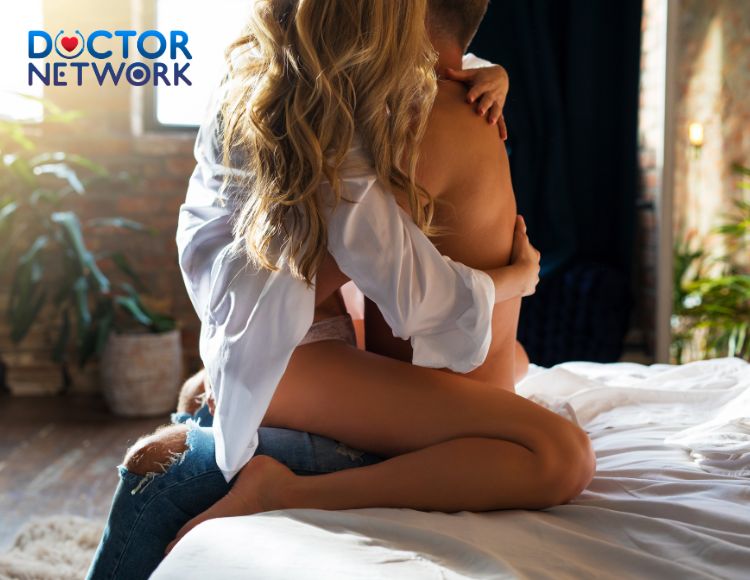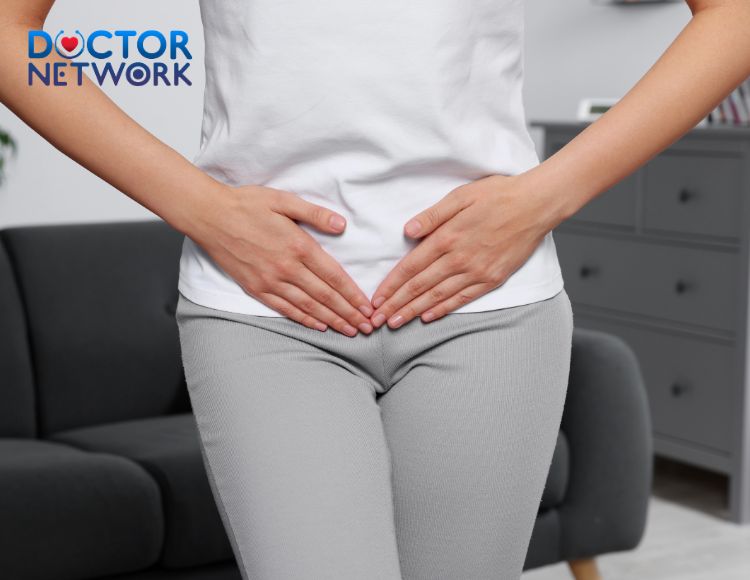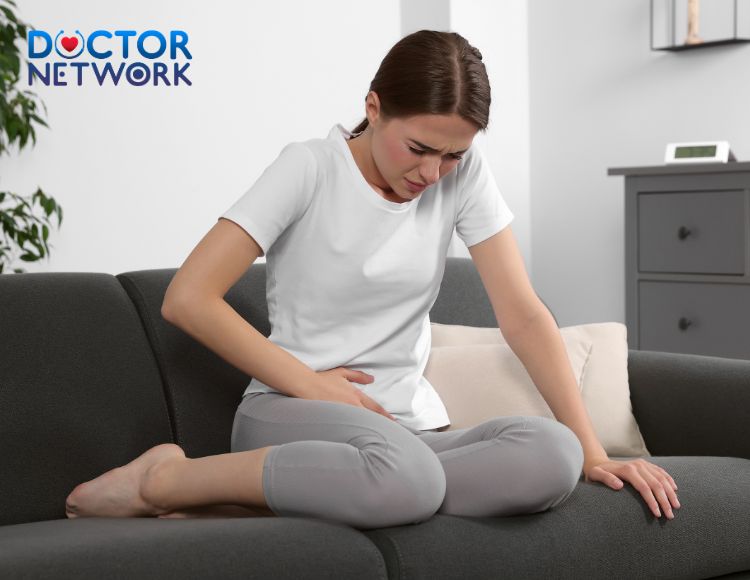Experiencing lower abdominal pain after intercourse can be perplexing and concerning for many, significantly affecting their sexual quality of life. This condition affects both men and women, although it’s more common in women. This article aims to help you understand the possible causes, when to seek medical attention, and effective preventive measures.
Common Causes of Lower Abdominal Pain After Intercourse
Sexual intercourse-induced pain – lower abdominal pain after intercourse
- Sexual positions: Some positions may exert pressure on the lower abdomen, especially if intercourse is too vigorous.

Some positions may exert pressure on the lower abdomen, especially if intercourse is too vigorous
- Lack of foreplay: If a woman’s body hasn’t produced enough natural lubrication, intercourse can result in dryness and discomfort.
- Prolonged intercourse – lower abdominal pain after intercourse: Extended intercourse can lead to blood congestion in the pelvic area, resulting in pain.
Gynecological Causes (Women)
- Pelvic inflammatory infections – lower abdominal pain after intercourse: Conditions such as vaginal infections, cervicitis, etc., can make reproductive organs more sensitive, leading to pain even with mild stimulation.

Conditions such as vaginal infections, cervicitis, etc., can make reproductive organs more sensitive
- Endometriosis: The displacement of endometrial tissues outside the uterus can cause persistent dull abdominal pain, worsening during and after intercourse.
- Uterine fibroids: lower abdominal pain after intercourse – Benign tumors in the uterus can cause pressure, discomfort, and pain during intercourse.
- Ovulation pain: Some women experience dull pain in one side of the lower abdomen around ovulation, which might coincide with intercourse.
Urinary Tract Related Causes
- Urinary tract infections (UTI): Inflammation in the bladder, urethra, etc., can cause a burning sensation in the lower abdomen, especially intensifying after intercourse (both in men and women).
- Prostatitis (in men): Inflammation of the prostate gland can cause aches and discomfort in the lower abdomen, which may worsen during intercourse or ejaculation.
Symptoms to Note – Indicators of Health Concerns Requiring Gynecological Examination
- Severe pain: Intense and persistent pain significantly affecting daily activities.
- Prolonged pain: Pain persists for hours or days without significant relief.
- Abnormal vaginal discharge: Unusual color, odor, or presence of blood in vaginal discharge.
- Vaginal bleeding outside menstrual periods: This signals the need for prompt medical evaluation.
- Associated symptoms: High fever, nausea, vomiting, etc.

Associated symptoms – lower abdominal pain after intercourse
When to Seek Medical Attention
If lower abdominal pain after intercourse occurs frequently, persists, or worsens over time. If accompanied by any other abnormal symptoms, especially fever, unusual vaginal bleeding, foul-smelling discharge, etc. When concerned and wanting to understand the underlying causes, ruling out serious medical conditions.
Management and Prevention of Lower Abdominal Pain After Intercourse
Addressing the underlying cause: Seek medical evaluation for an accurate diagnosis.
Physicians may prescribe medications or recommend corresponding treatments (antibiotics, anti-inflammatories, gynecological interventions, etc.).
Temporary pain relief measures and appropriate lifestyle adjustments:
- Resting and limiting vigorous physical activity.
- Applying gentle warmth to the lower abdomen.
- Opting for gentler intercourse and ensuring adequate foreplay to enhance natural lubrication.
- Maintaining proper genital hygiene and avoiding aggressive cleaning.
- Using condoms to prevent infections.
FAQs Related to lower abdominal pain after intercourse
- Is lower abdominal pain after intercourse dangerous?
- Most cases of post-coital lower abdominal pain are not dangerous, often related to sexual activity-induced discomfort (positions, lubrication issues, etc.), or benign conditions. However, if accompanied by high fever, abnormal bleeding, severe pain, immediate medical attention is warranted.
- Does lower abdominal pain after intercourse indicate pregnancy?
- Lower abdominal pain after intercourse isn’t necessarily a sign of pregnancy. If there’s suspicion, pregnancy tests or ultrasound scans can provide accurate results. Early pregnancy symptoms may include missed periods, nausea, breast tenderness, etc.
- How long does lower abdominal pain after intercourse last?
- The duration of lower abdominal pain after intercourse varies depending on the underlying cause. Discomfort due to uncomfortable intercourse may subside within hours. For medical conditions, recovery time depends on treatment response and disease severity.
- What should I do if I experience lower abdominal pain and bleeding after intercourse?
- Lower abdominal pain with bleeding post-coitus is abnormal and requires prompt gynecological evaluation. Possible causes include cervical polyps, cervicitis, or more serious conditions, necessitating medical assessment.
- How can I prevent lower abdominal pain after intercourse?
- Preventive measures for post-coital abdominal pain include:
- Ensuring adequate foreplay and lubrication.
- Opting for comfortable sexual positions, avoiding those causing pressure.
- Using lubricants if necessary.
- Maintaining proper genital hygiene.
- Seeking medical evaluation for recurrent pain to address underlying issues effectively.
- Preventive measures for post-coital abdominal pain include:
Scientific Evidence on lower abdominal pain after intercourse
- Incidence:
- A study by Harvard Medical School reports that around 20-30% of reproductive-age women experience post-coital lower abdominal pain at least once.
- This incidence might be higher in women with a history of gynecological infections, endometriosis, or during ovulation.
- Causes:
- A survey published in the Sexual Medicine Journal found that:
- 52% of women experienced post-coital lower abdominal pain due to uncomfortable sexual positions.
- 38% attributed it to inadequate lubrication.
- 27% reported gynecological conditions like pelvic inflammatory infections, endometriosis, etc.
- NIH research indicates that UTIs account for 15-20% of post-coital lower abdominal pain in women, while prostatitis can cause similar symptoms in men.
- A survey published in the Sexual Medicine Journal found that:
- Symptoms:
- According to Mayo Clinic, post-coital lower abdominal pain is often dull and may radiate to the hips, lower back, or thighs. Additional symptoms may include nausea, bloating, and discomfort during urination, along with abnormal vaginal bleeding.
- Treatment:
- Treatment guidelines from the American College of Obstetricians and Gynecologists (ACOG) emphasize addressing the underlying cause.
- Management may involve lifestyle modifications, symptom relief measures, or specific medical treatments targeting the identified cause.
- Prevention:
- Recommendations from the Centers for Disease Control and Prevention (CDC) focus on safe sexual practices, genital hygiene, lubricant use, and regular gynecological check-ups to prevent and address post-coital lower abdominal pain effectively.
Lower abdominal pain after intercourse, though not uncommon, warrants appropriate attention. Don’t hesitate to seek medical advice for accurate diagnosis and treatment, safeguarding your health and well-being as well as that of your partner.
References:
Kiểm Duyệt Nội Dung
More than 10 years of marketing communications experience in the medical and health field.
Successfully deployed marketing communication activities, content development and social networking channels for hospital partners, clinics, doctors and medical professionals across the country.
More than 6 years of experience in organizing and producing leading prestigious medical programs in Vietnam, in collaboration with Ho Chi Minh City Television (HTV). Typical programs include Nhật Ký Blouse Trắng, Bác Sĩ Nói Gì, Alo Bác Sĩ Nghe, Nhật Ký Hạnh Phúc, Vui Khỏe Cùng Con, Bác Sỹ Mẹ, v.v.
Comprehensive cooperation with hundreds of hospitals and clinics, thousands of doctors and medical experts to join hands in building a medical content and service platform on the Doctor Network application.

























